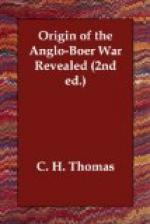We may here consider whether such a demand contained any real feature of unfairness to warrant refusal.
Three-fifths of the entire white Transvaal population were Uitlanders, the majority of them English. They own four-fifths of the total wealth invested in the State. About half of them have been domiciled, with house and other fixed property, for periods of from five to ten years and more.
The preponderance is not only in numbers and wealth, but also in intelligence and in contributing at least four-fifths of the total State revenues.
Is it right or prudent to exclude such interests and such a majority from legislative representation?
Could a minority of one-fifth, that is to say, twelve Uitlander members against forty-eight Boer members, be said to constitute a menace to the status or to the conservative interests of State?
Do Uitlanders not deserve equal recognition with the burghers in respect to intrinsic interest in the land, seeing that the former supplied all the skill and the capital to explore and exploit the mine wealth, all at their risk, and without which it would all have remained hidden and the country continued fallow and poor?
Though one-fifth would be so small a minority, it would at least have afforded the constitutional method of declaring the wishes of Uitlanders, and have done away with the disquieting and less effective practices of Press agitations, public demonstrations, and petitions. The measure could also have been expected to open up the way towards reconciling relations between the English and Boer races, beginning in the Transvaal, where it was hoped that the burghers would be gained over as friends, and so to stand aloof from the Afrikaner




